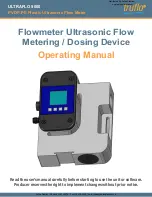
44
3. Diving with Galileo
Along these lines, Galileo employs a variable
ideal ascent rate: its value ranges between
7 and 20m/min and the actual breakdown
by depth range is listed in the table below.
depth
(m)
<6 <12 <18 <23 <27 <31
<35 <39 <44 <50 >50
speed
(m/min)
7 8
9 10 11 13
15 17 18 19 20
depth
(ft)
<20 <40 <60 <75 <88
<101
<115 <128 <144 <164 >164
speed
(ft/min)
23 26 29 33 36 43
49 56 59 62 66
During an ascent, the nitrogen loading bar
graph is replaced by a graphical ascent rate
indication. The full height of the bar graph
represents twice the ideal ascent rate, so
that when you are ascending at the ideal
ascent rate half of the bar graph is lit. If more
than half of the bar is lit you are ascending
too fast. In addition, for
CLASSIC
and
FULL
only, Galileo displays the ascent rate
numerically in place of the temperature.
If the ascent rate is greater than 110% of
the ideal value the message
ASCENT TOO
FAST!
appears.
The following pictures show how the ascent
rate alarm message and the ascent rate
value are displayed for the various screen
confi gurations.
Galileo also provides an audible alarm in
case of ascent rates exceeding 110%: the
intensity of the alarm increases in direct
proportion to the degree that the ideal
ascent rate is exceeded.
- In case of a fast ascent, Galileo may
require a decompression stop even
within the no-stop phase because of the
danger of microbubble formation.
- From great depth a slow ascent may
cause heightened saturation of tissues
and an extension of both decompression
duration and total ascent time. At shallow
depth, a slow ascent may shorten the
decompression duration.
- Excessive ascent rates for longer
periods are entered in the logbook.
!
WARNING
The ideal ascent rate must not be exceeded at
any time since this could lead to microbubbles
in the arterial circulation which could cause
serious injury or death.
Both the visual and the audible alarm persist
for as long as the ascent rate is 110% or
more of the ideal ascent rate.
3.2.2 MOD/ppO
2
!
WARNING
- The MOD should not be exceeded. Disregarding
the alarm can lead to oxygen poisoning.
- Exceeding a ppO
2
of 1.6bar can lead to
sudden convulsions resulting in serious
injury or death.
In
CLASSIC
confi guration, the alarm message
MOD EXCEEDED
is displayed in place of
the no-stop or decompression information
for 12 seconds, after which it is repeated in
Содержание Galileo sol
Страница 1: ...English ...
Страница 2: ......
















































